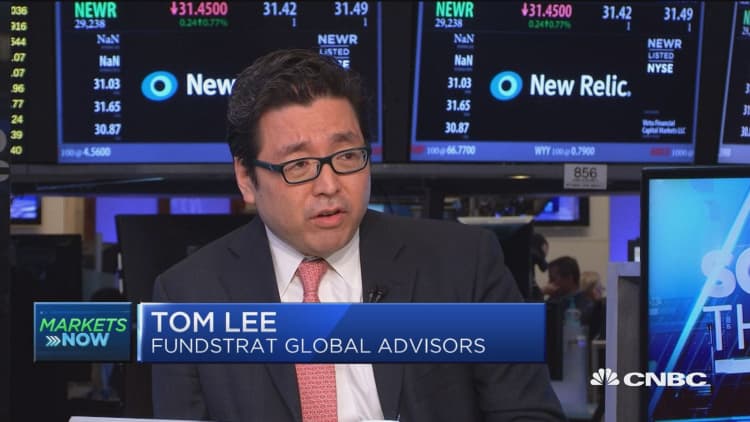
Investors are too concerned with the Federal Reserve's second interest rate increase in the current tightening cycle, Fundstrat Global Advisors' Tom Lee said Monday.
Expectations for a summer hike had jumped after minutes from the central bank's April meeting showed policymakers were likely to raise rates in June if second-quarter growth came through. But last week's disappointing U.S. payrolls report for May — a critical data point in the Fed's decision-making — sent those expectations plummeting.
When the Fed does deliver higher rates, it will not necessarily signal trouble for stocks, according to Lee.
"Second Fed hikes, when they're gradual … the market takes them in stride," Lee told CNBC's "Squawk on the Street."
Stocks typically rise in the three months after the second rate increase in a tightening cycle, except when that hike is 175 basis points or more, according to Fundstrat research. Stock markets were up 7 out of the last 11 times the Fed raised rates by fewer than 175 basis points.
The central bank is only expected to raise rates by 25 basis points after an initial quarter-point hike in December.
Should the Fed decide to hike this summer, Lee believes it will be against a backdrop of improved global growth conditions after a weakening of the dollar, a rally in crude oil prices and an easing of credit conditions.
"These are all setting the stage for growth to pick up, and I don't think that's what investors are expecting. I think everyone's worried about 'Brexit' and the Fed," he said, referring to the U.K. referendum on its membership in the EU later this month.
As further evidence, Lee pointed to the fact that the energy, industrials and materials sectors are rallying, which he said typically does not indicate the end of a business cycle.
He also noted that technicians are openly discussing an all-time high in the advance-decline line, a measure of how many stocks are participating in a rising or falling market. According to Lee, since 1965, a new high on the advance-decline line has always been followed by an all-time high in stock indexes.
"I do think in the summer we're going to have new highs," he said.
The is now off its all-time intraday high of 2,134.72 by roughly 1 percent.


